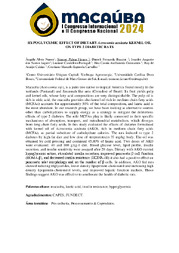Hypoglycemic effect of dietary Acrocomia aculeata kernel oil on type 2 diabetic rats.
Hypoglycemic effect of dietary Acrocomia aculeata kernel oil on type 2 diabetic rats.
Author(s): NUNES, A. A.; FAVARO, S. P.; BUCCINI, D. F.; JAQUES, A. dos S.; PORTUGAL, L. C.; GUIMARÃES, R. C. A.; CALDAS, R. de A.; CARVALHO, C. M. E.
Summary: Macauba (Acrocomia ssp), is a palm tree native to tropical America found mostly in the wetlands (Pantanal) and Savannah like area (Cerrados) of Brazil. Its fruit yields pulp and kernel oils, whose fatty acid compositions are very distinguishable. The pulp oil is rich in oleic acid, the macauba provides also kernel oil rich in medium chain fatty acids (MCFAs) accounts for approximately 50% of the total composition, and lauric acid is the most abundant. In our research group, we have been looking at alternative sources other than carbohydrates to supply energy as a strategy to mitigate the deleterious effects of type 2 diabetes. The
Publication year: 2024
Types of publication: Abstract in annals or event proceedings
Unit: Embrapa Agroenergy
Keywords: Hyperglycemia, Insulin resistance, Lauric acid, Macaúba
Observation
Some of Embrapa's publications are published as ePub files. To read them, use or download one of the following free software options to your computer or mobile device. Android: Google Play Books; IOS: iBooks; Windows and Linux: Calibre.
Access other publications
Access the Agricultural Research Database (BDPA) to consult Embrapa's full library collection and records.
Visit Embrapa Bookstore to purchase books and other publications sold by Embrapa.

